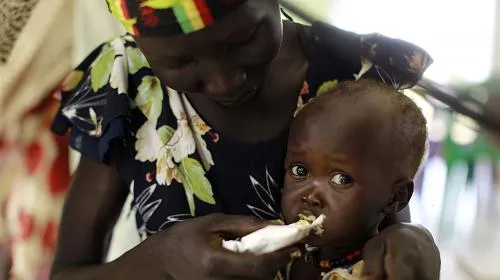While humanitarian needs are exploding, aid flow has drastically decreased; 1 million people risk starvation
JUBA, South Sudan (Feb. 27, 2018) — More than 5 million people in South Sudan urgently need food assistance, the global humanitarian organization CARE warned today. According to today’s released Integrated Food Security Phase Classification (IPC) analysis, 48 percent of the population is in urgent need of food aid. The report further warns that about 1 million people are in imminent danger of starvation if they do not receive food assistance immediately.
More than 7 million people might not have enough to eat from May to July.
“What we’re witnessing is beyond human imagination. We’ve seen the hunger in South Sudan get worse every year, and every year agencies like CARE do their best to respond,” says Rosalind Crowther, CARE’s country director in South Sudan. “But the needs keep growing and we’re seeing more hunger in more places. We’re especially seeing a significant increase in malnutrition among children in communities where CARE is working.
“Women and girls are being forced to take the most drastic measures in order to survive. CARE is supporting the affected women and girls with information about where they can go for legal and counselling assistance. We have also set up facilities where the women get medical and psychosocial support.”
The use of rape and sexual violence as weapons of war by parties to the conflict has created untold trauma among the South Sudanese population. Many of those seeking refuge are women and girls, often targets of further gender violence as they make their arduous journeys.
Since last year, the country has witnessed escalating conflict, which has forced many South Sudanese to flee their homes. Many farmers have abandoned their fields for the same reason. It is projected that South Sudan will have a deficit of estimated cereal needs in 2018 measuring 482,000 metric tons.
So far, CARE has distributed more than $13 million in food assistance to more than 500,000 people in Unity, Jonglei, Upper Nile and Eastern Equatorial states in the past 12 months. Still, this remains a drop in a relentlessly expanding ocean.
“Our resources are stretched,” says Crowther. “There’s an urgent need for donors and the humanitarian community to step up our assistance so we can reach more people. If we don’t, the repercussions could be catastrophic.”
Since the conflict began in December 2013, more than 4 million South Sudanese have fled their homes. Nearly 90 percent of the forcibly displaced are women and children and nearly 65 percent are under 18. More than 2 million have sought refuge in neighboring countries, but nearly the same number of people remain in South Sudan, living in host communities or Protection of Civilian (PoCs) sites.
About CARE
Founded in 1945, CARE is a leading humanitarian organization fighting global poverty. CARE places special focus on working alongside poor girls and women because, equipped with the proper resources, they have the power to lift whole families and entire communities out of poverty. Last year, CARE worked in 93 countries and reached more than 63 million people around the world. Learn more at care.org.
Media Contact
Nicole Harris, nharris@care.org, 404-735-0871

